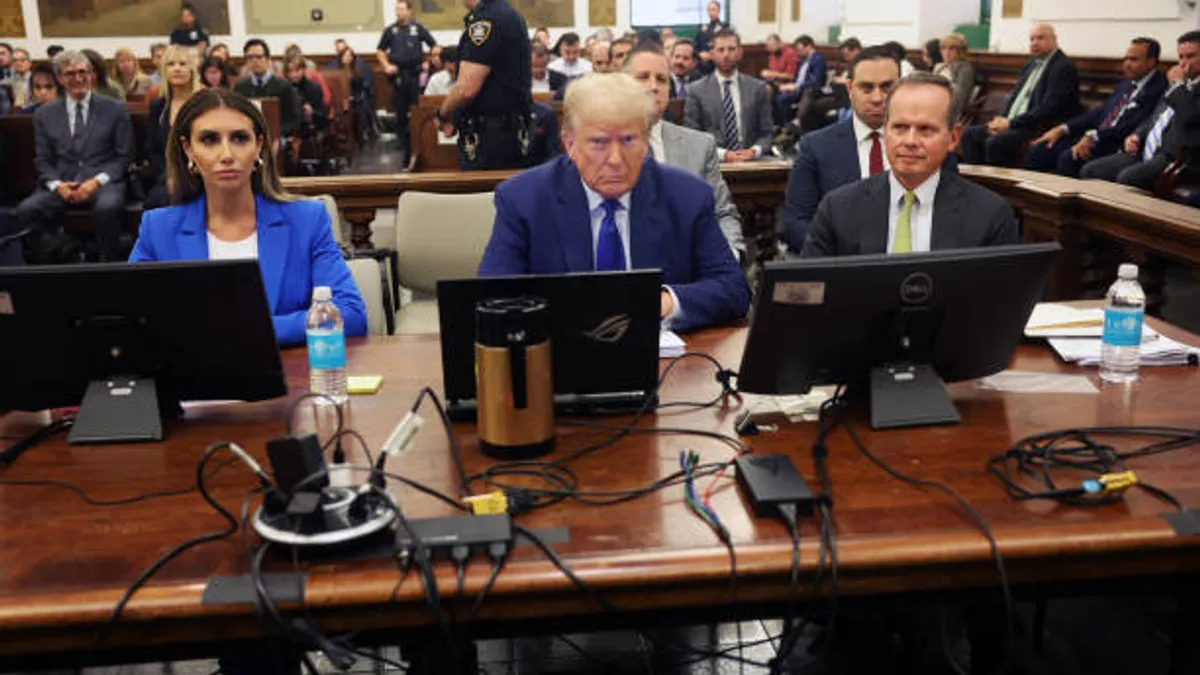Dive Brief:
- One day after Michael Cohen — former President Trump’s ex-attorney and one-time “fixer” who pleaded guilty in 2018 to lying to Congress and other charges — testified that he and Trump Organization ex-CFO Allen Weisselberg manipulated asset values in order to end up with the inflated net worth that his former boss wanted, Donald Trump’s attorneys sought to frame Cohen as a serial liar.
- During several hours of heated cross-examination Wednesday, Alina Habba — one of Trump’s attorneys — questioned Cohen about myriad past statements he made, including his allocation in which he pled guilty to tax evasion, as well as positive statements he made touting Trump’s success and saying he would “take a bullet” for Trump. Chris Kise, another Trump attorney, asserted state lawyers who called Cohen as a key witness were attempting to “rehabilitate an unrehabilitatable witness.”
- Trump effectively went after the credibility of the trial itself in remarks outside the courtroom. In a surprise twist after the lunch break, Judge Arthur Engoron called Trump to take the stand to answer the judge’s questions about an Associated Press report regarding a statement Trump made hours earlier to reporters outside the trial concerning an unnamed “person who’s very partisan sitting alongside” the judge. The judge rejected Trump’s assertion on the stand that he had been talking about Cohen — rather than Engoron’s law clerk — and fined Trump $10,000 for violating a limited gag order barring personal attacks on court staff.
Dive Insight:
Notable as a major $250 million civil fraud trial that could jeopardize the real estate empire of Trump, currently the front-running Republican candidate for president in the 2024 election, the trial is also a cautionary tale for CFOs and finance executives regarding the potentially serious costs of fraud or flawed financial reporting.
Taking the witness stand Tuesday across from his former boss Trump — who sat with his arms crossed for much of the day — Cohen described how he was asked by Trump “to increase the value of assets based upon a number he arbitrarily elected and my responsibility, along with Mr. Weisselberg’s, was to reverse engineer the various different asset classes to increase those assets’ values in order to achieve the number that Mr. Trump had tasked us with,” CFO Dive previously reported.
Cohen described it as an annual event in which Cohen and Weisselberg met with Trump and then worked backwards to determine the number that would yield the net worth that Trump thought he merited. Cohen said the process would take a few days, and that they used handwritten notes to mark the new values. He also said he would use articles about properties that had recently sold as well as Google searches to develop the reverse engineered numbers that would be used to update the annual statements that the Trump Organization showed to lenders, insurance firms and others.
On Wednesday, Habba pointed out that in 2015 the financial statements pegged the total value of the Trump assets at $6.58 billion, while, just two weeks later, Cohen appeared on CNN and said Trump’s net worth was likely more than $10 billion. Asked about the discrepancy, Cohen said that is what Trump told him to say. “You’re very good at playing that game,” Habba, wearing an electric blue suit, shot back.
Habba also sought to cast doubt on whether the meetings took place, asking whether there were any calendar records of the meetings that Weisselberg and Cohen had with Trump. Cohen said he did not keep records of them nor did he have an assistant who might have.
“That’s how things work at the Trump Organization,” said Cohen, who grew increasingly agitated during the cross-examination. “The door was constantly open at the Trump Organization. It was a constant carousel into his office.”
At the end of the day, Trump’s attorneys requested that the judge dismiss the case, asserting that the case hinged on Cohen, who was not a credible witness. Engoron swiftly denied the request.
“This case has evidence all over the place, credible all or not,” Engoron said before adjourning the trial for the day, rejecting the argument, saying he did not necessarily view Cohen as a key witness and that his equivocation was not grounds for dismissal. “No way no how is this case dismissed ... there’s enough evidence in this case to fill this courtroom.”
Cohen was called as a witness for the state and is not a defendant in New York Attorney General Letitia James’ case which alleges the former president — with help from some of his adult children and senior executives at the Trump Organization including Weisselberg — falsely inflated his net worth by billions of dollars to secure bank loans for the company on more favorable terms than would otherwise have been available to the company, among other motives.
Trump denies any wrongdoing and he and his attorney have argued that valuations are subjective, with Trump citing disclaimers in the documents that he said leave him off the hook.















